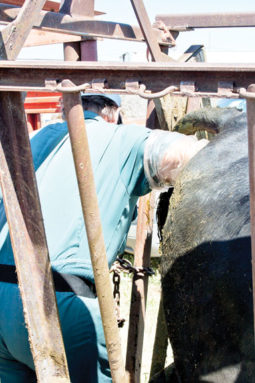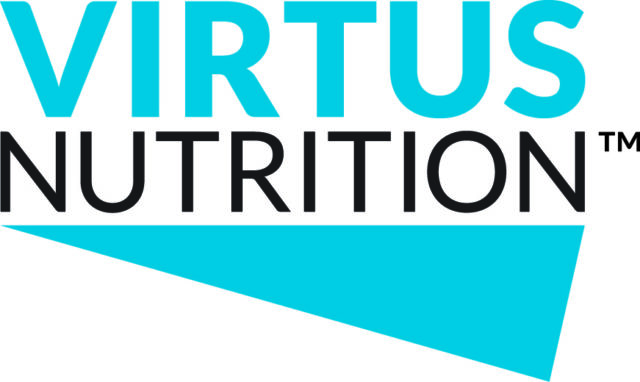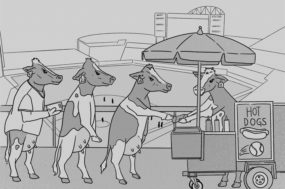Short of animal abuse, dairy owners are pretty much free to do whatever they want with their own cattle. That includes checking cows for pregnancy, whether by conventional trans-rectal palpation or ultrasound. But what about farm employees, consultants and veterinarian technicians? Are they allowed to preg check cows?
Laws differ from state to state. Some allow laymen to do pregnancy diagnosis, while others restrict it to licensed veterinarians only.
Idaho, for example, allows dairy owners and their “regular employees” to preg check cows. The state board of veterinarian medicine considers a “regular employee” to be anyone who’s required to fill out an IRS form W-4, so an independent contractor or consultant would not qualify.
Advancements in ultrasound technology have brought this issue into sharp focus. An article in the June 11th edition of Progressive Dairyman told the story of a new ultrasound training program launched by Colorado veterinarian Kevin McSweeney. McSweeney says ultrasound is a superior tool for pregnancy diagnosis and laymen can easily be trained to use it to decide whether a cow is pregnant or “open.”
As ultrasound usage becomes more commonplace on U.S. dairies, it raises the question: Who will be allowed to use it and under what circumstances?
In July 2010, the Minnesota Board of Veterinary Medicine issued a cease-and-desist order against a technician for performing ultrasound on a dairy without the knowledge of the veterinarian who employed her.
Minnesota law restricts pregnancy testing and diagnosis to veterinarians, but in this case the vet obtained a variance, allowing a technician to do the actual scanning.
The alleged violation took place in southwestern Minnesota, not far from South Dakota and Iowa. Differing state laws may have confused the vet technician, according to sources familiar with the case.
“Lay people can diagnose pregnancy legally in Iowa, I believe and, although it may be illegal in South Dakota, it’s not enforced. So apparently this person was confused about what was legal where,” says John King, DVM, executive director of the Minnesota Board of Veterinary Medicine .
Such enforcement actions appear to be few and far between.
As long as dairy owners have no problem with non-veterinarians preg checking their cows, there’s no compelling reason to report it, even in states where it’s technically illegal.
However, some worry about a lack of oversight.
If a layman messes up and calves are aborted as a result, it’s “too bad, so sad,” for the dairyman, King says. There’s no regulatory process to prevent that person from continuing to practice, as there would be with a veterinarian.
“These lay individuals who are being trained are not accountable to anyone,” he says. “There is no requirement for malpractice insurance, liability insurance or any accountability.”
McSweeney strongly disagrees.
Ultrasound technicians will succeed or fail based on the quality of their work, just like hoof trimmers or anyone else providing services on a dairy, he argues. Any technician who is incompetent will soon be weeded out.
“If they screw up, the word is going to get out pretty quickly,” McSweeney says. “There is nothing better than word-of-mouth from farmers and ranchers.”
McSweeney started his new business, International Bovine Training Solutions Inc ., in June, but he has been training people to do ultrasound preg testing for years.
“I’ve trained well over 100 non-vets to do ultrasound, and they are extremely proficient at it,” he says. “It’s a better diagnostic tool than palpation, which is still the primary way reproduction work is done in the U.S.”
Eventually, McSweeney would like to establish a small training facility, maybe one with a dormitory where students could stay for a few days or weeks at a time. For now, most of the training is done on large dairies belonging to some of his clients.
“Ultimately I would like to offer some type of certification for students,” he says.
It is not McSweeney’s intention to train people so they can start selling ultrasound services to multiple farms. He would rather see technicians as farm employees or working within a veterinary practice.
“That’s where I really see the big bang – a dairy having an ultrasound of its own and someone that knows how to use it and putting it to use on a very frequent basis to maximize its potential,” he says.
McSweeney knows that the increased use of ultrasound technicians may be threatening to some of his fellow veterinarians.
“There are a lot of veterinarians who are unhappy with this, but nobody as of yet has said anything or done anything egregious toward me,” he says. “But it’s still early.”
He’s also sensitive to the fact that pregnancy diagnosis and other reproductive services make up the bulk of the income for most veterinarians who work with cattle.
But his sympathy for his fellow vets only goes so far. “We can’t protect something just because it’s our bread-and-butter. I can’t justify that in my head,” McSweeney says.
“I think veterinarians definitely need to be involved in the management of dairies, but I think we need to progress from being the ones sticking our arms in the cows all the time to the ones interpreting the data,” he says.
When McSweeney uses technicians to perform ultrasound preg checking within his own veterinarian practice, he’s either physically on site or has some sort of video link so he can see what the tech is scanning.
A 2007 survey by the USDA found that 31.4 percent of dairy farms in the West that performed pregnancy diagnosis used someone other than a veterinarian.
McSweeney believes that pregnancy diagnosis by non-veterinarians, offering their services for a fee, is fairly widespread, even in states that officially prohibit it.
“The interesting thing is that the state veterinarian boards have no teeth against non-veterinarians,” he says. “They can send a cease-and-desist letter to the lay person, but they cannot prosecute. It’s up to the state attorney general to do that, and the AGs are very reluctant to do so if there is no problem other than veterinarians complaining about it.”
The American Association of Bovine Practitioners waded into the debate last year with the following policy statement: “Trans-rectal examination of the reproductive tract by palpation, ultrasound or any other method constitutes the practice of veterinary medicine and should be performed by or under the supervision of a licensed veterinarian.
Examination and assessment of the bovine reproductive tract is a skilled diagnostic procedure requiring integrative knowledge of anatomy, physiology and pathology to perform safely and correctly.”
Adds AABP Executive Director Gatz Riddell: “We have a lot of struggle defining how technicians can and should be used.”
Greg Ledbetter has seen the issue from three points of view: Dairyman, veterinarian and state regulator.
Ledbetter was named the 2004 Innovative Dairy Farmer of the Year as owner and operator of the C Bar M Dairy in Jerome, Idaho. He later served as state veterinarian in Idaho and now works for the California Department of Food and Agriculture in the Tulare area.
“There’s no question that anybody can be trained to be an ultrasound technician, but it’s making decisions based on what you’re seeing on that ultrasound – what treatments are you going to make or what diagnosis are you going to make – that’s what requires a veterinarian,” Ledbetter says.
“I have no problem if a dairy owner wants to have his veterinarian train someone on the farm to do (ultrasound), but it needs to be under the direction of his regular vet and they certainly have to have a veterinarian involved in the process to procure the drugs necessary to carry out a modern reproductive program,” he says.
Some states may consider amending their veterinarian practice acts to allow technicians to do pregnancy diagnosis on their own. A proposal to do that in Colorado was shot down a couple years ago under opposition from veterinarians.
Meanwhile, the industry will likely continue playing by the old playground rule: No harm, no foul. PD
Wilkins is a freelance writer based in Twin Falls, Idaho.
PHOTO
As long as dairy owners have no problem with non-veterinarians preg checking their cows, there’s no compelling reason to report it, even in states where it’s technically illegal. Photo by Philip Warren.







